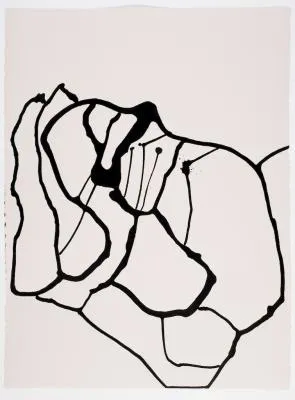
This month a pair of exhibitions -- Heather Watkins' "Movement of Objects at Rest" at PDX Contemporary Art and Julia Mangold's new drawings and sculptures at Elizabeth Leach Gallery -- are rife with similarities. Watkins and Mangold share a subdued, minimal aesthetic and, more often than not, a monochrome palette. Both investigate form, conceptually linking sculpture with related works on paper. Yet for all these similarities in tone and execution, their processes, influences and ambitions show how very different these two artists are.
At PDX, Watkins' show is dominated by a series of poured ink works on paper. She creates her pieces by dripping ink onto paper, then bends and rotates the paper to allow the ink to flow where it will. The resulting forms are entirely abstract, but, as certain patterns emerge, she develops a consistent vocabulary: sumptuous pools of ink, which fork into thick bands and slinky rivulets. While the repetition of these basic forms foregrounds the artist's command over the materials, it also reveals her openness to chance, her willingness to permit the ink a voice in the collaboration. In that sense, Watkins' project take its cues from John Cage's methodical use of chance in creating his artworks, as well as the poured canvases of second-wave Abstract Expressionist painters such as Kenneth Noland, Helen Frankenthaler and Morris Louis.
To complement her works on paper, Watkins has included a group of small sculptures: rough wooden blocks topped with coiled, painted stretches of rope. While these assemblages are unprepossessing, they translate the flowing ink of her paper works into physical terms, as the rope mimics the ink's winding patterns. More important, they highlight the distinctly different processes behind each body of work. While the ink requires the artist to relinquish some degree of control, the rope provides a physical analog of the liquid flow, which she can shape and fix into a desired position. Taken together, they suggest a resigned understanding of how much influence we can exert over our worlds. Quite simply, there are things we can take into our hands, while others remain beyond our grasp.
-- John Motley, The Oregonian
read full text here: http://www.oregonlive.com/art/index.ssf/2012/08/heather_watkins_and_jul…